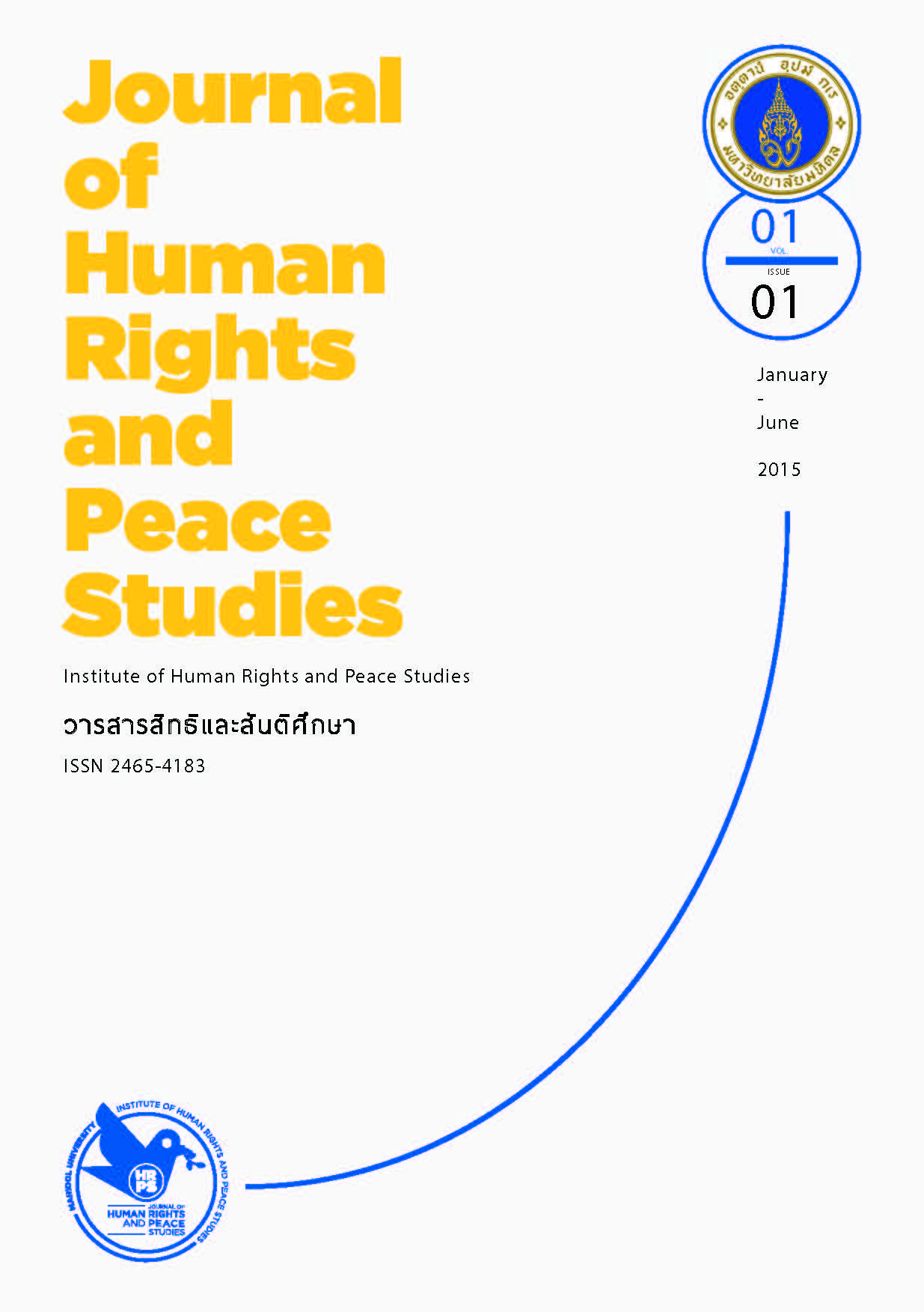Human Rights, Human Security and Peace
Main Article Content
Abstract
This short essay tries to point out the relationship among
human rights, human security and peace. The essence of the essay
is to explicate the necessary conditions for peace, domestic as well
as international. Peace denotes members of community living or
co-existing in harmony but once conflict occurs and results in
violent clashes, it will lead to a situation of ultima ratio regum.
The paper argues that human rights and human security are vital
in harmonious co-existence without which there may be war.
In order to maintain peace, human rights are to be respected and
these rights are now demanded by people in many parts of
the world. Human security is the essential elements of human
rights. Human security includes food security, health security,
political security, economic security, personal security, environmental
security and community security. Human rights and human
security are thus closely related. And in the final analysis, the two
major elements above are related to peace. In international
relations, discussions on war and peace are the common main
themes. The focus is on the causes of war or the breakdown of
peace and then an elaboration of mechanisms for peace by
the creation of such organizations as the League of Nations and
the United Nations. Human rights organizations such as Human
Rights Watch and the U.N. Universal Declaration of Human Rights
and International Covenant on Civil and Political Rights and like
featured as part of the measures to protect the fundamental rights
of human beings. The various organizations above, as this essay
tries to explain, can have a positive effect on the maintenance of
peace. The attempt is to pull the threads of human rights, human
security and peace into a fabric to give a glimpse of a coherent
whole. Peace presupposes protection of human rights and attempts
to foster human security.
human rights, human security and peace. The essence of the essay
is to explicate the necessary conditions for peace, domestic as well
as international. Peace denotes members of community living or
co-existing in harmony but once conflict occurs and results in
violent clashes, it will lead to a situation of ultima ratio regum.
The paper argues that human rights and human security are vital
in harmonious co-existence without which there may be war.
In order to maintain peace, human rights are to be respected and
these rights are now demanded by people in many parts of
the world. Human security is the essential elements of human
rights. Human security includes food security, health security,
political security, economic security, personal security, environmental
security and community security. Human rights and human
security are thus closely related. And in the final analysis, the two
major elements above are related to peace. In international
relations, discussions on war and peace are the common main
themes. The focus is on the causes of war or the breakdown of
peace and then an elaboration of mechanisms for peace by
the creation of such organizations as the League of Nations and
the United Nations. Human rights organizations such as Human
Rights Watch and the U.N. Universal Declaration of Human Rights
and International Covenant on Civil and Political Rights and like
featured as part of the measures to protect the fundamental rights
of human beings. The various organizations above, as this essay
tries to explain, can have a positive effect on the maintenance of
peace. The attempt is to pull the threads of human rights, human
security and peace into a fabric to give a glimpse of a coherent
whole. Peace presupposes protection of human rights and attempts
to foster human security.
Article Details
How to Cite
Dhiravegin, L. (2015). Human Rights, Human Security and Peace. Journal of Human Rights and Peace Studies, 1(1), 137–152. retrieved from https://so03.tci-thaijo.org/index.php/HRPS/article/view/163615
Section
Academic Articles
The views, opinions, and pictures expressed in this journal are those of the authors and do not necessarily reflect the opinions and viewpoints of the editor and the editorial board. All rights are reserved by the authors and the Institute of Human Rights and Peace Studies of Mahidol University. No part of this journal may be reproduced, stored in a retrieval system, or transmitted in any form or by any means without the prior permission in writing from the journal’s editor, or as expressly permitted by law, or under terms agreed with the appropriate reprographics rights organization. Non-commercial use of information in this journal must be properly referenced.


